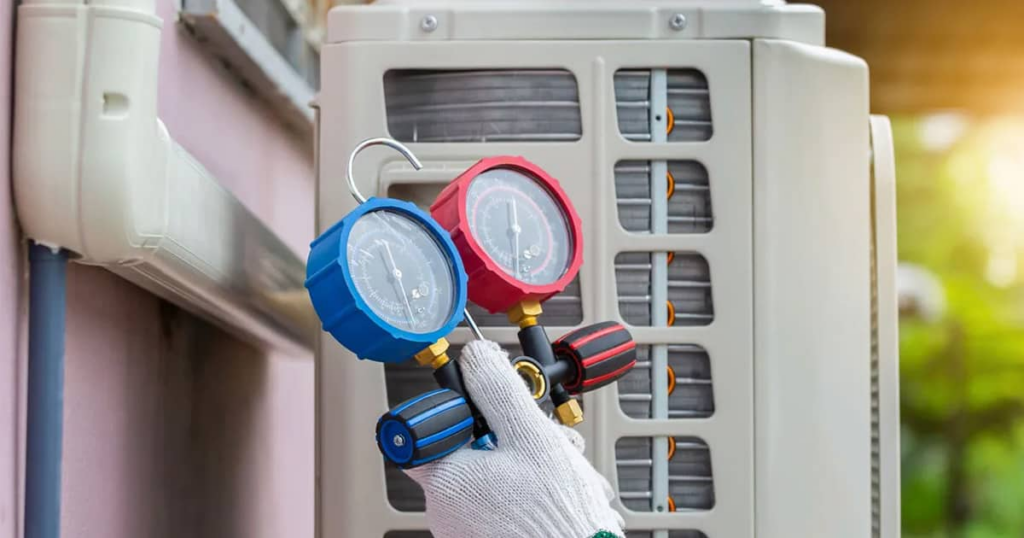Noticing water leaking from your air conditioner? It’s definitely not something you want to ignore—especially during the peak of Florida’s summer heat. A leaking AC unit can lead to expensive repairs, water damage, or even mold if left unchecked. Fortunately, most AC leaks stem from a handful of common issues.

Let’s break down the 6 most likely causes of an AC water leak—and what you should do if it happens in your home.
1. Clogged Condensate Drain Line
One of the most common reasons for AC leaks is a clogged drain line. Dirt, dust, mold, and debris can build up inside the line, causing water to back up into your unit instead of draining outside. Over time, this leads to noticeable leaks around your system.

What to do: Turn off your AC and call a professional. HVAC techs use specialized tools (like a vacuum or pressurized air) to safely clear the line.
2. Faulty Condensate Pump
If your system relies on a condensate pump to move water outside, and that pump fails, leaks are bound to happen. Improper installation or wear and tear over time can cause it to break down or disconnect.

What to do: A technician can assess whether the pump can be repaired or needs to be replaced. Ignoring this issue could result in water overflow and damage.
3. Low Refrigerant Levels
Low refrigerant doesn’t just affect cooling—it can cause coils to freeze. When those coils eventually thaw, the resulting water can overwhelm your system and cause leaks. And remember: refrigerant levels should never drop unless there’s a leak in the line or compressor.

What to do: If you suspect a refrigerant issue, shut the system off and call for service immediately. Only certified HVAC technicians should handle refrigerant.
4. Damaged or Rusted Drain Pan
Your AC’s drain pan collects condensation and directs it to the drain line. But if that pan becomes rusted or develops cracks—especially in systems over 10 years old—it can’t do its job. The result? Water starts leaking under or around your unit.

What to do: A replacement drain pan is usually a straightforward fix. Have your technician inspect it during your next service.
5. Dirty Air Filter
A clogged air filter restricts airflow, which can cause the evaporator coils to freeze. Once the ice melts, the excess water can leak into areas it shouldn’t—especially if the drain pan or line is already compromised.

What to do: Replace your filter every 1–3 months. It’s one of the easiest and most effective ways to keep your system running smoothly.
6. Running the AC When It’s Too Cold Outside
Surprisingly, running your AC during cooler temperatures (especially below 60°F) can lead to frozen coils. Once they thaw, all that water needs to go somewhere—and if your drain pan is blocked with ice, it can easily spill over.

What to do: Only use your AC when the outdoor temps are appropriate. For cooler weather, switch to “fan only” or consider using other ventilation options.
What Should You Do If Your AC Is Leaking?
If you see water pooling around your AC unit, turn it off immediately to prevent further damage. Then, reach out to a professional HVAC technician to assess the cause and make necessary repairs.
A leaking air conditioner is more than just a nuisance—it’s a warning sign that something in your system needs attention. From clogged drain lines and dirty filters to low refrigerant and damaged components, identifying the cause early can save you from expensive repairs, water damage, and even health hazards like mold.
If you notice water pooling around your unit or unusual cooling behavior, don’t wait. Turn off your system and call the trusted professionals at Smart Home Air & Heat. Our expert technicians will diagnose the issue, make the necessary repairs, and help ensure your AC is ready to keep you cool—safely and efficiently—all summer long.
📞 Call today or schedule service online and let us help you protect your home and your comfort.
